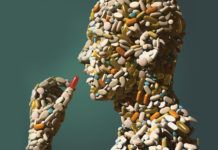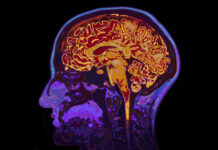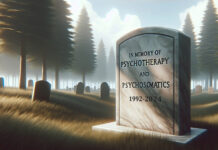Kids Are Not the Problem: An Interview With Gretchen LeFever Watson
In this interview, Brooke Siem, who is the author of a memoir on antidepressant withdrawal, May Cause Side Effects, interviews Gretchen LeFever Watson, PhD.
Gretchen...
“All Real Living Is Meeting”: Brent Robbins on Love, Death, and the Possibilities of...
Psychologist and existential thinker Brent Robbins reflects on a lifetime of work, the limits of psychiatric diagnosis, and what facing mortality has taught him about joy and human connection.
The Maudsley Deprescribing Guidelines: An Interview with David Taylor and Mark Horowitz
Tapering should be tailored and adjusted to the patient, slowed and more hyperbolic in people who have severe and longstanding reactions.
“War Cry For Change”: Veterans Launch Campaign for Informed Consent and Safe Deprescribing at...
Derek Blumke and Timothy Jensen: The Grunt Style Foundation leads a new phase in the movement to combat psychiatric drug harm.
Peer-Support Groups Were Right, Guidelines Were Wrong: Dr. Mark Horowitz on Tapering Off Antidepressants
In an interview with MIA, Dr. Horowitz discusses his recent article on why tapering off antidepressants can take months or even years.
A Short History of Tardive Dyskinesia: 65 Years of Drug-Induced Brain Damage That Rolls...
Psychiatry has long turned a blind eye to the full scope of harm associated with TD. New TD drugs "work" by further impairing brain function.
Anatomy of an Industry: Commerce, Payments to Psychiatrists and Betrayal of the Public Good
Pharmaceutical companies paid psychiatrists $340 million from 2014 through 2020, corrupting every aspect of the testing and marketing of new psychiatric drugs.
Heritability Explains Less About Mental Disorders Than You Think
The focus on diseased brains and genes obscures the significance of social and environmental influences.
The Parts Within Us: An Interview with Richard Schwartz, Creator of Internal Family Systems
IFS is a different paradigm, which says that rather than being a sign of pathology, it’s the nature of the mind to have “parts." We’re born that way because they're all valuable.
Mad Sisters: An Interview With Susan Grundy
Susan Grundy on her lifelong caregiving journey for an older sister diagnosed with schizophrenia at the age of 13.
Surviving Antidepressants: An Interview with Adele Framer
That is the truth about withdrawal syndrome: It’s like a 50-50 chance that you’re going to have a problem. If you’re in the unlucky half, you’re gonna be really unlucky.
Lancet Psychiatry Needs to Retract the ADHD-Enigma Study
Lancet Psychiatry, a UK-based medical journal, recently published a study that concluded brain scans showed that individuals diagnosed with ADHD had smaller brains. That conclusion is belied by the study data. The journal needs to retract this study.
UPDATE: Lancet Psychiatry (online) has published letters critical of the study, and the authors' response, and a correction.
Do Antipsychotics Protect Against Early Death? A Review of the Evidence
Psychiatry is now claiming that research has shown that antipsychotics reduce mortality among the seriously mentally ill. A critical review of the literature reveals that this claim is best described as the the field's latest "delusion" about the merits of these drugs.
Criticisms That Establishment Psychiatry Can and Cannot Tolerate
Criticism that uniquely applies to establishment psychiatry but not to medicine in general threatens its existential legitimacy, and is not tolerated.
From Freud to Fanon: How Daniel Gaztambide is Redefining Psychoanalytic Practice
In this interview, Daniel Gaztambide discusses how decolonial perspectives can transform psychoanalytic practice.
Psychotherapy and Psychosomatics: End of an Era for Independent Journals? An Interview With Giovanni...
Giovanni Fava joins us to discuss the uncertain future of the journal 'Psychotherapy and Psychosomatics' which he edited for thirty years and which has been essential to our understanding of the impact of psychiatric treatments.
Psychiatry, Fraud, and the Case for a Class-Action Lawsuit
For decades, psychiatry committed medical fraud when it told the public that antidepressants fixed a chemical imbalance in the brain.
The Failure of “Spit For Science”: No Genetic or Neurological Pathways for Substance Abuse
Despite finding no meaningful correlation between genes and substance use, high-profile geneticists misleadingly conveyed optimistic results.
Exploding Myths About Schizophrenia: An Interview with Courtenay Harding
The Vermont Longitudinal Study, led by Courtenay Harding, belied conventional beliefs about schizophrenia by showing remarkably good outcomes for patients discharged in the 1950s and '60s.
Muzzled by Psychiatry in a Time of Crisis
The American Psychiatric Association and its former president, Jeffrey Lieberman, have used the Goldwater Rule to try to silence Yale psychiatrist Bandy Lee and colleagues who warned, in a collection of essays, about why President Trump is "dangerous." Why would a guild choose to do this?
Anders Sørensen – Tackling Psychiatric Drug Withdrawal Through Research and in Practice
Anders Sørenson is a Danish clinical psychologist with a special interest in psychiatric drug withdrawal. He has undertaken research which assesses the state of guidance on psychiatric drug withdrawal and paid close attention to tapering methods with the aim of identifying approaches which might make withdrawal more tolerable for people.
Medication-Free Treatment in Norway: A Private Hospital Takes Center Stage
At the Hurdalsjøen Recovery Center in Norway, patients with a long history of psychiatric hospitalizations are tapering from their medications and, in a therapeutic environment that emphasizes a good diet, exercise, and asking patients "what do they want in life," are leaving their old lives as chronic patients behind.
Psychology’s Small Stories and the Call of the Other: An Interview with David Goodman
Ayurdhi Dhar interviews David Goodman about his vision for a psychology grounded in care for the other, the risks of psychotherapeutic standardization, and why humility—and even embarrassment—may be vital to human flourishing.
Teralyn Sell and Jenn Schmitz: Breaking Out of the Prison of Prescribing and Finding...
On the Mad in America podcast, Brooke Siem talks with Teralyn Sell and Jenn Schmitz about their journey from working in the prison system to challenging conventional psychiatric narratives in their therapy practice and podcast, The Gaslit Truth.
The Editorial Demise of Psychotherapy and Psychosomatics Is Bad News For Us All
Karger’s decision to replace the editorial leadership without consultation is extraordinary, abruptly ending decades of success and accumulated expertise.

































